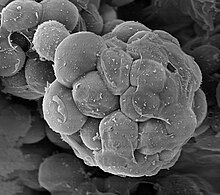Creolimax fragrantissima
| Creolimax fragrantissima | |
|---|---|

| |
| Scientific classification | |
| Domain: | Eukaryota |
| (unranked): | Holozoa |
| Class: | Ichthyosporea |
| Order: | Ichthyophonida |
| Family: | Creolimacidae |
| Genus: | Creolimax |
| Species: | C. fragrantissima
|
| Binomial name | |
| Creolimax fragrantissima Marshall, 2008
| |
| Synonyms[1] | |
|
Ichthyophonida sp. fragrantissima | |
Creolimax fragrantissima is a single-celled protist that occupies a key phylogenetic position to understand the origin of animals. It was isolated from the digestive tract of some marine invertebrates, mainly from the peanut worm, collected from the Northeast Pacific.
Taxonomy
Creolimax is a member of the Ichthyosporea, which is the earliest branching holozoan lineage.[2]
Applications
Creolimax is one of the few ichthyosporeans that is culturable. It can be easily grown in the lab through cycles of asexual reproduction. Each cycle comprises two stages. First, a growth stage, in which the cells, which are non-motile, contain several nuclei, a cell wall, and a big central vacuole. This stage is followed by a release of motile amoeboids, which are mono-nucleated and non-dividing.[3][4] Characterising those two stages can help to elucidate the development of specific cell types in multicellular animals.
Moreover, it has been shown that Creolimax uses a complex gene regulation system, including long non-coding RNAs and exon skipping alternative splicing, which were normally associated with multicellular animals.[4]
References
- ^ "Creolimax fragrantissima". NCBI taxonomy. Bethesda, MD: National Center for Biotechnology Information. Retrieved 17 November 2017.
Other names: synonym: Ichthyophonida sp. fragrantissima Lineage( full ) cellular organisms; Eukaryota; Opisthokonta; Opisthokonta incertae sedis; Ichthyosporea; Ichthyophonida; Creolimax
- ^ Torruella, G.; Derelle, R.; Paps, J.; Lang, B. F.; Roger, A. J.; Shalchian-Tabrizi, K.; Ruiz-Trillo, I. (2012-02-01). "Phylogenetic Relationships within the Opisthokonta Based on Phylogenomic Analyses of Conserved Single-Copy Protein Domains". Molecular Biology and Evolution. 29 (2): 531–544. doi:10.1093/molbev/msr185. ISSN 0737-4038. PMC 3350318. PMID 21771718.
- ^ Marshall, Wyth L.; Celio, Gail; McLaughlin, David J.; Berbee, Mary L. (2008-07-01). "Multiple isolations of a culturable, motile Ichthyosporean (Mesomycetozoa, Opisthokonta), Creolimax fragrantissima n. gen., n. sp., from marine invertebrate digestive tracts". Protist. 159 (3): 415–433. doi:10.1016/j.protis.2008.03.003. ISSN 1434-4610. PMID 18539526.
- ^ a b Mendoza, Alex de; Suga, Hiroshi; Permanyer, Jon; Irimia, Manuel; Ruiz-Trillo, Iñaki (2015-10-14). "Complex transcriptional regulation and independent evolution of fungal-like traits in a relative of animals". eLife. 4: e08904. doi:10.7554/eLife.08904. ISSN 2050-084X. PMC 4739763. PMID 26465111.
